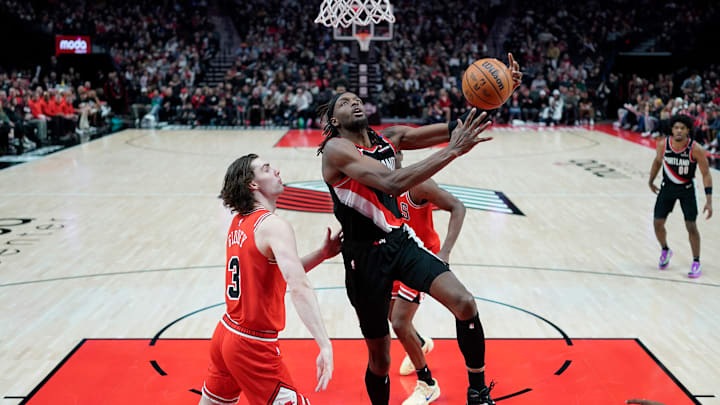As soon as Patrick Williams put the pen to paper on his five-year, $90 million extension, everyone, but ostensibly the Chicago Bulls' Front Office, knew of the ramifications. On the heels of restricted free agency, Williams had plateaued in Chicago after being selected fourth overall in 2020.
The Florida State product went from averaging 9.2 points, 4.6 rebounds, and 1.4 assists per game as a 19-year-old rookie to 10.0 points, 3.9 rebounds, and 1.5 assists as a 22-year-old fourth-year pro. In addition to his plateauing counting stats, his true shooting percentage decreased from 56.2 to 55.3 percent over the same time frame.
Patrick Williams' contract is borderline untradeable
ESPN graded Chicago's decision to re-sign Williams a "D," writing, "This contract for Williams seems like the latest case of the Chicago front office overvaluing the talent on the team's own roster, which has produced below-.500 results each of the past two seasons." A year later, another sub-.500 season and another season of Williams underperforming.
On a positive note, Williams' $18 million per season pact isn't crippling the Bulls' finances. The 23-year-old will take up merely 12 percent of Chicago's salary cap room. Still, he's not deserving of $72 million over the next four seasons unless he finally makes due on his once-acclaimed sky-high potential, which isn't likely to happen five years after he was drafted.
While ridding themselves of Williams' contract seems impossible, there's one Western Conference team the Bulls must contact—the Portland Trail Blazers. Portland doesn't necessarily have a need for the 6-foot-7 forward, yet it rosters a player with an even worse contract than Williams.
Following a season in which he averaged 20.5 points and shot 47.5 percent from the floor and 40.1 percent from three, Jerami Grant, having just turned 29, inked an exorbitant five-year, $160 million deal. The contract wasn't heavily criticized at the time, but it was still frowned upon, especially coming from a team that had won 33 games a year prior. To make matters worse, the Blazers committed to a full-on rebuild after re-signing Grant, sending franchise stalwart Damian Lillard to Milwaukee months later.
Jerami Grant's contract is shaping up to be one of the NBA's worst
The Trail Blazers' return on investment has been less than stellar. Grant played well in his first season after signing the pact, but he only appeared in 54 contests, and his defense suffered at the expense of a heavier offensive burden. Then came 2024-25. Grant's points per game decreased from 21.0 to 14.4, and his field goal percentage cratered from 45.1 to 37.3 percent. Moreover, he played in a career-low 47 games.
Despite the Blazers improving, going from 21 to 36 wins, Grant was a detriment. Portland was 6.3 points per 100 possessions worse with the swingman on the floor. For comparison, the Blazers were 6.1 points and 1.0 points better with Grant on the court in 2022-23 and 2023-24, respectively.
With a burgeoning roster that includes 21-year-old Shaedon Sharpe and 24-year-olds Deni Avdija and Toumani Camara on the wing, there's no room for 31-year-old Grant, who's set to account for roughly 21 percent of the Trail Blazers' salary cap space. Whilst signing Grant to a five-year contract was a mistake, signing him to a backloaded contract was even more so.
Grant will earn $32 million in 2025-26, $34 million in 2026-27, and $36.4 million as a 33-year-old in 2027-28. His contract is fully guaranteed with zero outs. Grant's contract was arguably better than Williams' a year ago, despite being double the amount. Fast forward to now, and it's safe to say Williams' $18 million is far less damaging.
The Bulls' opportunity to trade Williams is evident
Yet in the midst of every crisis lies great opportunity. Over the past few seasons, the league's savvier executives have made a living acquiring draft compensation alongside bad contracts to alleviate fellow executives' poor financial decisions. The Oklahoma City Thunder made a living utilizing this strategy to build a championship contender.
Dating back to 2020, Sam Presti and the Thunder have notably acquired Danny Green ($14 million), James Johnson ($15 million), Al Horford ($28 million), Kemba Walker ($34 million), Derrick Favors ($9.7 million), and JaMychal Green ($7.5 million) while receiving six first-round picks in doing so along countless second-rounders in various other trades.
The Bulls have never utilized this underrated strategy, but now is the time, if any, to begin. Shipping Williams to Portland alongside Lonzo Ball, in exchange for Grant, would clear up roughly $21 million for the Blazers. Swap Ball out for Kevin Huerter, and Portland's payroll rises slightly in the interim, but it frees up $30 million over the next few seasons.
Of course, acquiring Grant and the remaining $102 million he's yet to be paid isn't the Bulls' only gain in such a scenario. Acquiring one of Portland's future first-round picks, such as the Bucks' 2028 first-rounder or perhaps multiple second-rounders, would be included to grease the wheels.
The notion that Williams is completely untradeable is false. Every NBA player is trade-worthy under the right pretenses. Sure, it's fair to say Williams won't be easy to trade, but Portland might be just as, or more, desperate to rid themselves of Grant's bloated contract. And acquiring a 23-year-old accompanied by a rotation player is no consolation, even if it means parting with future draft compensation.
